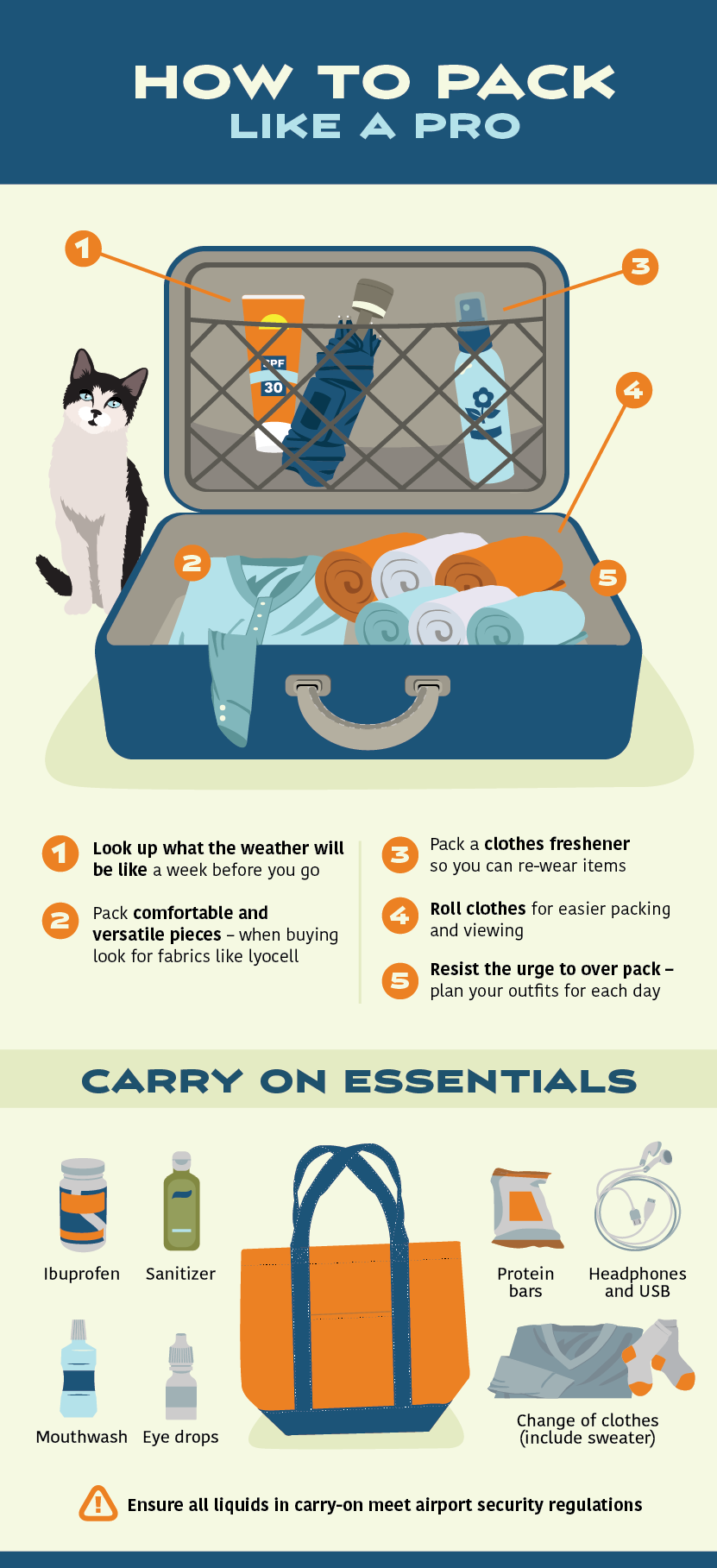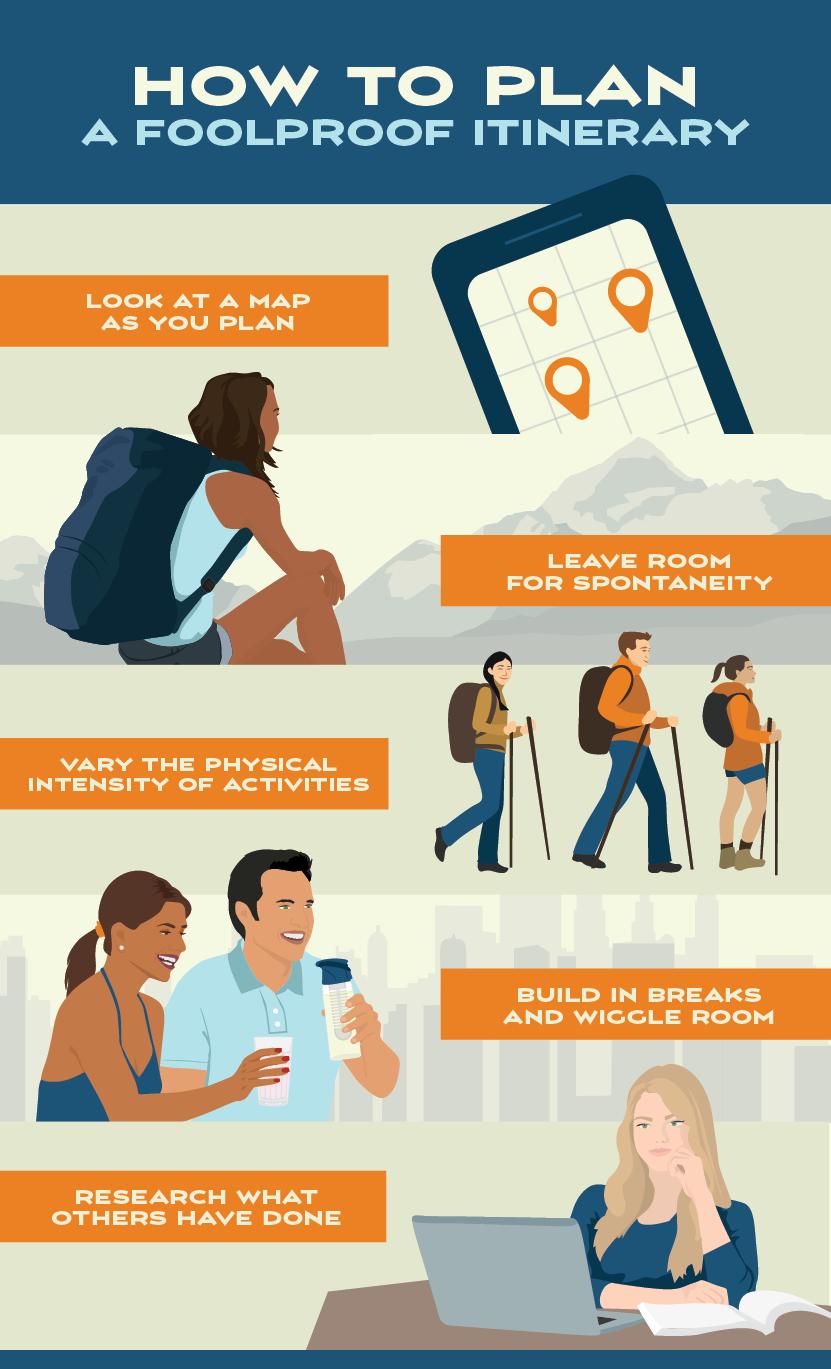Vacation Planning
Planning your next vacation needn’t be overwhelming. Arm yourself with these helpful tips, tricks, and lists and you’ll be well on your way to your best vacation yet.
RESEARCH – WHERE DO I START?
Guidebooks can be a good place to start gathering inspiration, and many of the well-known and trusted names (like Lonely Planet, Fodor’s, and Rough Guides) have great online resources, but looking to less-traditional sources is a good idea, too. Try browsing some travel blogs (here are 24 of the best in 2016 according to Fathom) to read about people’s real and honest experiences visiting a destination. Check the publication date of everything you research and try to find sources that have been published within the past few months or year.
HOW TO CHOOSE THE RIGHT DESTINATION FOR YOU
In choosing where to book your next vacation, you may find it useful to make a list of all the things that are important for you and your family to make the most of your time. While Mom may be interested in visiting museums, Dad might prefer to spend his time eating at good restaurants, while the kids are gunning for outdoor adventures.
Different areas of the world suit different tastes in travel. While the Caribbean is perfect for sun and sand, it won’t pack the same cultural punch as Europe. South America and Africa can appeal to the adventurous type, while Asia is a bigger shift in culture.
Here are some things to consider when picking your destination:
How Much Time and Money do You Have?
If it’s just a few days and you have a small budget, you can make the most of your vacation by staying closer to home. Consider doing a couple of day trips rather than paying to stay at a hotel overnight. If you’ve got a couple of weeks and your budget is tight, consider cheaper options like camping or road-tripping instead of flying. If there’s wiggle room in the budget and you’d rather not spend time hashing out the details, consider going with a tour company. Guided tours can often help you pack in more than you might otherwise be able to when you don’t have a lot of time and you don’t know much about the destination.

How much traveling experience do you have?
If you’re a beginner traveller, choose destinations that are easier to navigate and have a more established tourism infrastructure (think big international cities like London, Paris, and New York, or well-trodden Caribbean destinations like the Bahamas and Puerto Rico) rather than off-the-beaten-track destinations. Again, consider traveling with a tour company if you’re not confident in your ability to get around independently. It’s also a great way to discover new destinations you may not feel so confident about navigating yourself.
How different are the goals of each person you’re traveling with?
If everyone has a different idea of the perfect vacation, try to find somewhere that can cater to everyone. Smaller and more well-developed countries (many in Europe) often have a broader range of options within a more manageable geographic area. Check to see what activities are available in the area you’ll be staying. Sometimes hotels and resorts will offer discounts for local activities.
When are you travelling?
This is a hugely important question because it determines things like weather, crowds, and prices, which can significantly change the nature of the destination you’re hoping to visit. If you’re traveling during North America’s summertime (July/August/September), remember that it’s actually winter in places like Australia, and it can get incredibly crowded in popular European cities. Consider traveling to places during their “shoulder seasons” for fewer crowds, lower prices, and decent weather. Make sure to check the weather before you book. You don’t want to find out after the fact that you’ve booked yourself into a hurricane-season holiday!

HOW TO PACK LIKE A PRO
Even seasoned travelers can struggle with packing. Inevitably, we end up packing things we never touch and leaving behind some of the things we desperately needed! Here are some packing tips to help you get it right:
Watch the Weather
Look up what the weather will be like a week before you go. You may be headed for sun and sand, but if you’re not prepared for those two rainy curveballs you’ll be kicking yourself later.
Resist the Urge to Overpack
It’s no fun lugging around a suitcase you can barely handle, so plan a series of flexible outfits to fit the number of days you’ll be away. Throw a clothes freshener into your suitcase so you can rewear items without having to wash them. Roll clothes for easier packing and viewing Rolling your clothing rather than folding them can make it easier to fit items into small spaces (and can help avoid big creases) and easier to see what you’ve packed.
Pack Items That Are Comfortable and Versatile
It can be worth investing in some go-to travel wardrobe staples like a good pair of hiking shoes/sandals and a few moisture-wicking T-shirts. Look for fabrics like lyocell for items with a comfy amount of stretch and that won’t wrinkle as easily.

How to Plan a Foolproof Itinerary
The number one tip I have for people planning their itineraries is don’t try to pack too much into one day! On paper it may seem like you can do it all, but in reality things often take much longer and more effort than you imagine. Here are some good tips for building the perfect itinerary.
Look at a Map as You Plan
Are the things you want to do within walking distance or will you need to plan other transportation? Look up transport schedules to make sure you’ll be able to get around when you want to. And don’t forget about the hills! Things can look close by on a map, but then you get there and find there’s a mountain of a hill between you and there.
Build in Breaks and Wiggle Room
It’s impossible to anticipate crowds, lines, and delays beforehand, so build some wiggle room into your schedule. If you estimate one of your activities might take two hours, add 10 to 15 minutes of breathing space to that. Also, you’re not a vacationing machine. Give yourself time to rest!
Vary the Physical Intensity of Activities
If you’re hiking a volcano one day (and you don’t do that sort of thing regularly), don’t book your first surfing lesson the next. Your body will need time to recover, so plan some lounging by the beach or some museum time.
Leave Room for Spontaneity
Don’t plan your itinerary with military precision. Allow some free time so you can decide what you want to do in the moment. This will let you take advantage of unplanned opportunities to explore and discover more of your destination than you thought you could.
Research What Other People Have Done
Take a tip from those who have come before you. Maybe there’s something you wouldn’t have taken a second look at that might actually be worth checking out. Check out reviews on TripAdvisor to help you make decisions.
Whether you’re planning your first big vacation or you’re just looking to do it better this time, keep these tips in mind for planning a healthy and happy trip!
 This has been a guest blog post with thanks to Fix.com
This has been a guest blog post with thanks to Fix.com
